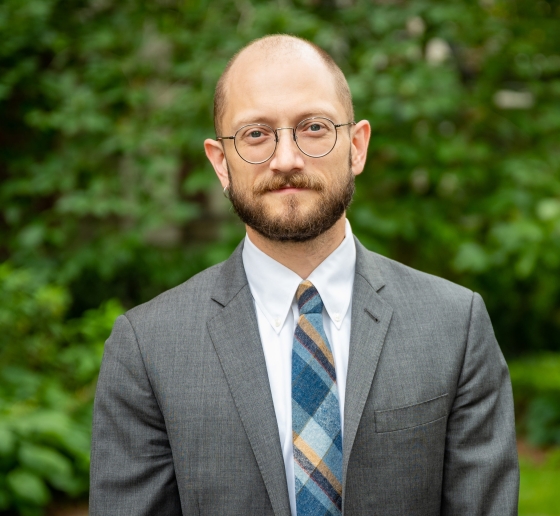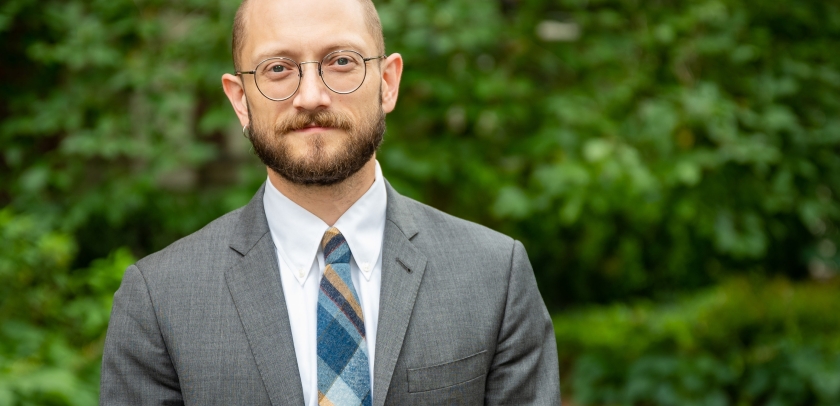Clinic Succeeds in Pushing FDA on Clinical Trial Transparency
Christopher Morten, associate clinical professor of law, and clinic students Kasey Clarke ’24 and Nancy Lu ’24, share how students in the Law School’s Science, Health, and Information Clinic have worked to improve public access to the results of clinical trials and, in the process, made the FDA more transparent and accountable.

Columbia Law’s Science, Health, and Information Clinic has pushed the Food and Drug Administration to fulfill its obligation to enforce clinical trial transparency, on behalf of the clinic’s client Universities Allied for Essential Medicines (UAEM).
Since 2021, the Science, Health, and Information Clinic has jointly represented UAEM with students from SMU Dedman School of Law’s First Amendment Clinic. Together, they have improved public access to the results of clinical trials and, in the process, made the FDA more transparent and accountable.
Clinical trial transparency—prompt, thorough, reliable, and universal access to results and other information from clinical trials of drugs, vaccines, devices, and other medical interventions—is critical because it allows patients and health care providers to make informed healthcare decisions, researchers to advance science, economists and policymakers to determine which medical interventions are the most cost-effective, and taxpayers to monitor the studies that their tax dollars fund.
Congress mandated clinical trial transparency in a federal statute, the Food and Drug Administration Amendments Act of 2007 (FDAAA). The FDAAA requires that universities, drug and medical device companies, and other entities that run clinical trials—known as “responsible parties”—register and report the results of most important clinical trials in the United States on a public database, ClinicalTrials.gov. Congress empowered the Department of Health and Human Services (HHS) to enforce this law, allowing it to levy stiff monetary penalties along with other tools for enforcement. In 2012, HHS delegated this enforcement power to the FDA.
UAEM’s Efforts to Make Progress
UAEM is a nonprofit, independent, international, student-run advocacy organization that aims to make medicine and research more accessible. In the late 2010s, after noticing significant FDAAA noncompliance among responsible parties, UAEM North America began publicly targeting notable noncompliant responsible parties—especially major research universities—to share results missing from the ClinicalTrials.gov database. Through its advocacy, UAEM significantly improved trial transparency at dozens of major research universities—including Columbia.
However, by early 2021, UAEM had hit a roadblock. Thousands of trials were noncompliant with the FDAAA’s clinical trial transparency mandate, and UAEM simply lacked the capacity to go after all noncompliant responsible parties. Further, these responsible parties had little incentive to comply with the FDAAA. Despite having the power, since 2012, to levy fines and take other enforcement actions, the FDA had never done so. The FDA’s inaction signaled to responsible parties that it was OK to withhold results from ClinicalTrials.gov, despite such withholding being in violation of federal law.
To make meaningful progress on the issue of clinical trial transparency, UAEM needed to get the attention of the FDA and convince or compel the agency to take enforcement action against noncompliant trials. In this next step of its campaign, UAEM’s student leaders turned to fellow students for legal assistance. Specifically, they sought help from the members of Columbia Law School’s Science, Health and Information Clinic and SMU Dedman School of Law’s First Amendment Clinic.
UAEM and Clinic Partnerships
Clinic students have advocated alongside UAEM for clinical trial transparency through a variety of legal avenues:
In early 2021, UAEM had worked with the NYU Technology Law & Policy Clinic to file Freedom of Information Act (FOIA) requests seeking information about the FDA’s FDAAA enforcement priorities. These requests may have prompted the FDA’s first ever FDAAA Notice of Noncompliance, sent to Acceleron Pharma Inc. on April 27, 2021. Since 2021, the Science, Health, and Information Clinic has continued to file FOIA requests for UAEM, and the SMU Clinic has handled UAEM’s FOIA appeals.
In April 2022, Science, Health, and Information Clinic students helped UAEM draft a letter to then-newly confirmed FDA Commissioner Robert Califf, explaining why he should make FDAAA enforcement a priority.
- In February 2023, Science, Health, and Information Clinic students filed a citizen petition on behalf of UAEM, asking the FDA to improve FDAAA enforcement. Citizen petitions are formal submissions by the public that request the FDA take specific actions. Under the FDA’s own rules, it must respond to every petition. The Science, Health, and Information Clinic and UAEM requested that the FDA increase its issuance of Pre-Notices and Notices of Noncompliance to noncompliant responsible parties; publish a clear, expanded framework of its enforcement priorities; and create a public dashboard tracking when and to whom the agency sends Pre-Notices, making it easier to track the FDA’s enforcement efforts and track specific noncompliant trials.
- Throughout this time, Science, Health, and Information Clinic students and UAEM members visited Washington, D.C., to speak with members of Congress about the petition. In January 2023, Rep. Frank Pallone (D-NJ) sent a letter to the FDA, flagging concerns and citing UAEM’s work. In September 2023, Rep. Neal Dunn (R-FL) sent the FDA a letter of his own, demanding that the agency respond substantively to UAEM’s February 2023 petition.
The collaboration has advanced UAEM’s mission. Together, UAEM, Columbia Law’s Science, Health, and Information Clinic, and the SMU Clinic have obtained thousands of pages of previously secret FDA and National Institutes of Health documents through FOIA requests. Columbia Law’s clinic students have also helped UAEM review the produced documents to identify key evidence of the FDA and NIH’s past enforcement efforts and plans for future enforcement. UAEM has disseminated some of the findings of its FOIA investigation in the medical literature and in op-eds.
Outcomes and Next Steps
In February 2024, the FDA substantively responded to UAEM’s citizen petition. While the FDA declined to increase its enforcement efforts or publish an updated enforcement framework, it agreed to consider UAEM’s proposed enforcement framework in the future. The FDA also launched the Pre-Notices for Potential Noncompliance dashboard and credited UAEM for the idea in its response. The FDA’s creation of the Pre-Notices dashboard is a major transparency victory, and it prompted a new wave of media coverage of the work done by UAEM and its clinic student attorneys.
Students across the three groups—UAEM, Columbia Law’s Science, Health, and Information Clinic, and the SMU First Amendment Clinic—have described the collaboration as eye-opening. Students came to the clinical trials transparency campaign from diverse backgrounds, with interests ranging from health justice and health policy to administrative law regulating the FDA to intellectual property to access to information and media law to privacy (a countervailing interest in FOIA work).
“I joined this project because I was interested in FDA law,” said Nancy Lu ’24, a Spring 2023 Columbia Law Science, Health, and Information Clinic student who worked on the citizen petition and Congressional advocacy. “My team members were interested in public accountability and nonlitigation advocacy, and we were each able to take on work that played to our strengths. I also got to experience forms of legal advocacy that I otherwise would not have explored in law school—I never thought that I’d be meeting with Congressional staffers on behalf of clients as a law student!”
UAEM, Columbia Law, and SMU students are hopeful about the future of FDAAA enforcement. “We’ve seen FDAAA enforcement improve significantly since UAEM has aimed its clinical trials transparency campaign on agency actors. At this point, we have the FDA’s attention, and they are warming up to taking their enforcement duties more seriously,” said Kasey Clarke ’24, a Fall 2022 clinic student, who helped draft the citizen petition.
“The Science, Health, and Information Clinic has been instrumental in achieving recognition from the FDA. Their support has allowed advocacy efforts to be boosted by clear evidence of FDA’s historical failure to act on FDAAA—evidence UAEM and the public wouldn’t otherwise have the ability to access. I’m proud to be part of a collaboration supporting crucial patient safety,” said Allisun Wiltshire, a UAEM clinical trials transparency team member.
Still, there is a long way to go—as of August 2024, the FDA has issued only five total Notices of Noncompliance. Columbia Law’s Science, Health, and Information Clinic will continue to advocate alongside UAEM and the SMU Clinic for better FDA enforcement of the public’s right to access clinical trials information.
“Our collaboration on FDAAA enforcement is fundamentally an access-to-information project to enrich the public’s understanding of medical science,” said Science, Health, and Information Clinic Director Christopher Morten, associate clinical professor of law at Columbia Law School. “It’s also, fundamentally, a health justice, gender justice, and racial justice project—we need trial sponsors to disclose who’s enrolled in their trials and to disclose trial results promptly, especially from the trials most essential to patient care.”
“One of the most important values our students can learn through their work in the SMU Clinic is that real transparency—the kind that builds trust in public institutions—takes time, and requires persistence,” said Peter Steffensen, law fellow and adjunct clinical professor of law in the SMU First Amendment Clinic. “It has been a pleasure to partner with Columbia Science, Health, and Information Clinic and UAEM on their vital efforts to keep pressure on the FDA to improve FDAAA enforcement.”
